June 20, 2025 | 21:20 GMT +7
June 20, 2025 | 21:20 GMT +7
Hotline: 0913.378.918
June 20, 2025 | 21:20 GMT +7
Hotline: 0913.378.918
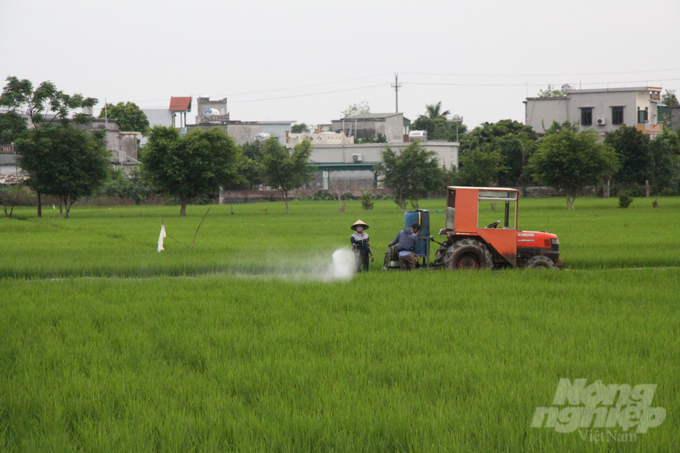
Spraying by machine at a large field. Photo: Kien Trung.
Thai Binh province currently has 1,700 great fields if the area is ten hectares or more. If households cultivate 2 hectares or more, there are about 2,800 great fields.
The expansion of area size and the unity of a producer has helped farmers in Thai Binh have the opportunity to think big and do big: large-scale plantations ranging from a few dozen to hundreds of hectares have grown. The farmers who own large fields spent tens of billions of dong to renovate fields, invest in machinery, equipment, and factories, and implement mechanization in agriculture.
For the first time, fragmented plots of land in Thai Binh have been grouped into one. Large fields are a step forward in development, bringing many plots and plots to be divided among farming households into one piece with a larger, more concentrated area.
Steps to expand the area have created space for farmers in Thai Binh to have the opportunity to produce agricultural goods in depth.
Connect, create links, help each other, and attract investment resources in production organizations along the value chain. Supporting club members to access the province's guidelines, orientations, mechanisms, and policies in promoting the accumulation and concentration of agricultural land and organizing large-scale crop production in compliance with the regulations.
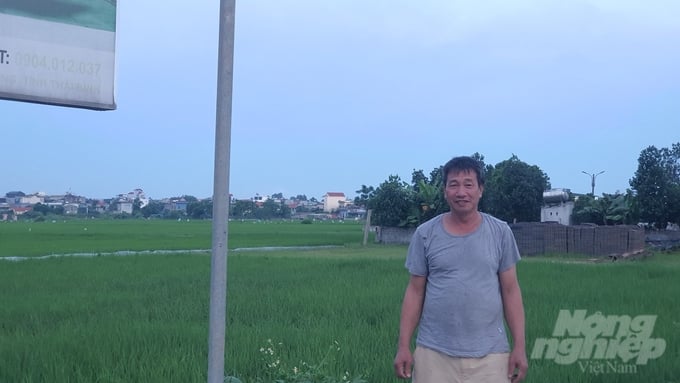
Do Van Dan - the head of the "Club of Farmers own large fields" in Thai Binh. Photo: Kien Trung.
In the context of high-input materials, seeds, fertilizers, pesticides, and machines amount to hundreds of millions... For large-scale production, it isn't easy. Many households must borrow billions of dong, invest hundreds of millions in the field for each crop, and wait for the grain. They must depend on natural disasters, enemy sabotage, weather, etc. Therefore, for farmers to be profitable in the field, in addition to learning from experience and saving input costs...another important dependent factor is the paddy's price at the season's end.
One of the obstacles to owning large fields is the problem of warehouses and factories. While the conditions of farmers are still tricky, they are not eligible to set up a project to rent land to build a warehouse, a rice storage house, or a drying factory... because to achieve this criterion, the investment amount is up to hundreds of billions of dollars.
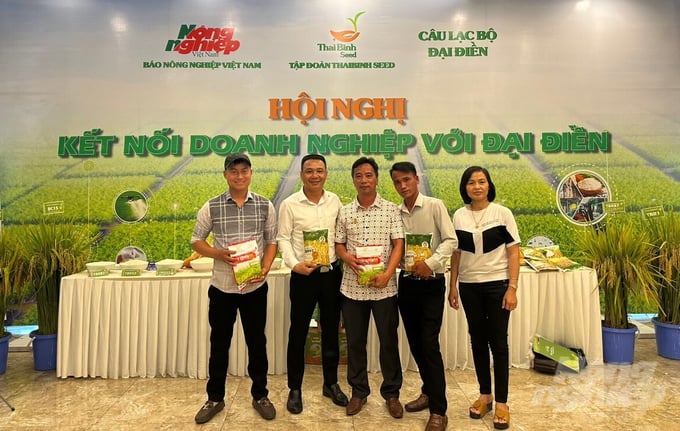
Typical big farmers of Thai Binh at the event Connecting businesses with big fields organized by Vietnam Agriculture Newspaper, ThaibinhSeed Group, and the Club of Farmers own large fields.
In recent years, before developing the model of large-scale rice farming households, Thai Binh has had many policies to support farmers. The province introduced regulations to help farmers with VND 40 million to purchase machinery and equipment to mechanize agriculture, introducing a mechanism to support 10-20kg of rice for those renting fields...
In recent years, land accumulation and concentration have increased dramatically. To date, 2,648 organizations, households, and individuals are accumulating and concentrating land in districts with a total area of more than 11,200 hectares, 1.5 times more in both number of households and area than in 2021.
Accumulating and concentrating land helps reduce abandoned fields, reduces average costs by VND 2 million/hectare, and increases economic efficiency by 1.4 times higher than average production. Land accumulation opens a new direction for agricultural production: large-scale commodity production associated with product consumption.

A large-scale field in Thai Binh. Photo: Kien Trung.
On July 12, 2023, the People's Council of Thai Binh province issued Resolution No.08 on regulations on mechanisms and policies to support land accumulation and concentration for agricultural economic development to 2028. Many new points are included in the Resolution, which many big farmers expect.
According to Resolution No.08, conditions for great farmers to enjoy support regimes and policies: in case of land accumulation and concentration in one, two, or three methods (including transfer of land use rights, lease land use rights, contribute capital with land use rights), ensure that the accumulated and concentrated land area is at least 0.5ha/field; the minimum stable land use right lease period is 5 years. In the case of land consolidation by the mode of production linkage, the minimum area of concentrated land must be at least 20ha.
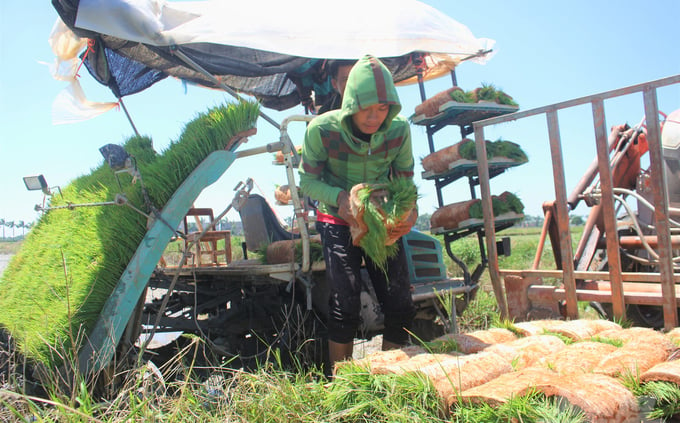
Prepare seedlings for transplanting. Photo: Trung Quan.
For people with land use rights, Thai Binh advocates encouraging households and individuals to transfer land use rights to other organizations, households, and individuals to accumulate land and receive cash support (1 time) of VND 2,800/m2;
For households that lease use rights or contribute capital with use rights, the province supports 15kg of rice/360m2/year (in case of a 5-year lease) and 25kg of rice/acre/year (in case of a 10-year lease).
For large farming households with a production scale of at least 50 hectares, the district-level People's Committee prioritizes inclusion in district-level annual land use planning and plans with a maximum area equal to 1% of the total area of accumulated rice growing areas and concentrates to carry out the order and procedures for converting land use purposes to build factories, plating areas, rice drying areas...
Translated by Tu Quyen
![Turning wind and rain into action: [10] Advancing accessible climate services for farmers](https://t.ex-cdn.com/nongnghiepmoitruong.vn/608w/files/linhnhp/2025/06/20/1911-z6704423696987_15fd32ffc26d590d204d520c9dac6786-nongnghiep-161854.jpg)
(VAN) Not only does it help farmers 'avoid droughts and rains,' the development of agricultural climate services also enhances their ability to proactively adapt to a rapidly changing climate.
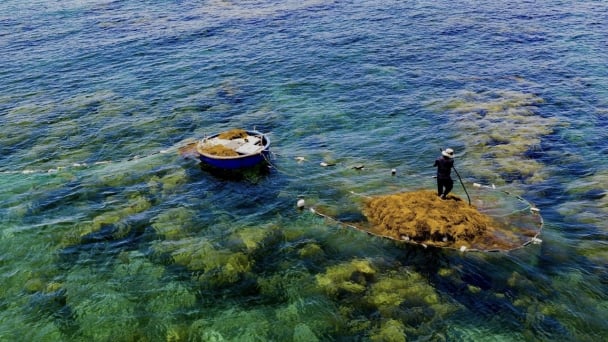
(VAN) With international assistance, the harvesting of sargassum seaweed in Quang Ngai has become increasingly regulated, thereby safeguarding marine life and ensuring the stability of coastal communities' livelihoods.
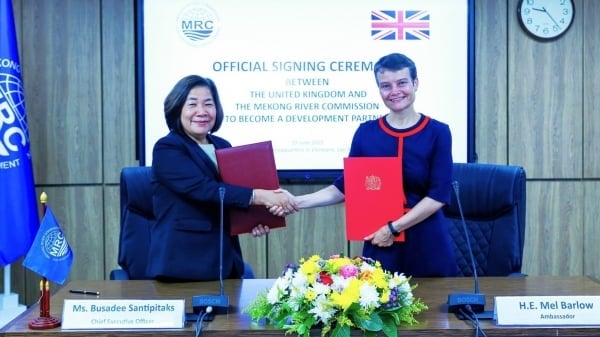
(VAN) On June 19, the United Kingdom officially became a Development Partner of the Mekong River Commission.

(VAN) Biodiversity is being threatened by traditional remedies made from wildlife. Traditional medicine and humans must change to live in harmony with nature.

(VAN) Agrifood investment and finance solutions for people and the planet.

(VAN) Microplastic contamination has become pervasive in seafood, posing unprecedented challenges for food safety and marine ecosystems.
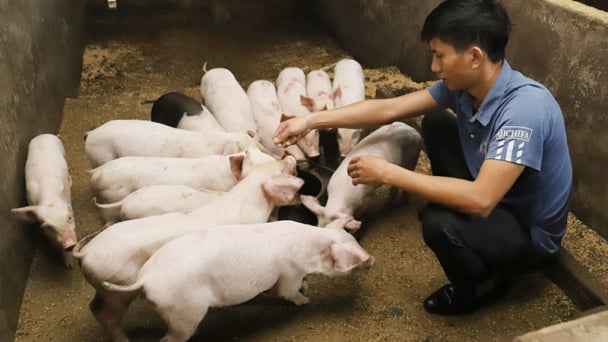
(VAN) Proactively using vaccines, combined with transport control and enhanced surveillance, is the only viable path toward biosecure and sustainable livestock production in Vietnam.